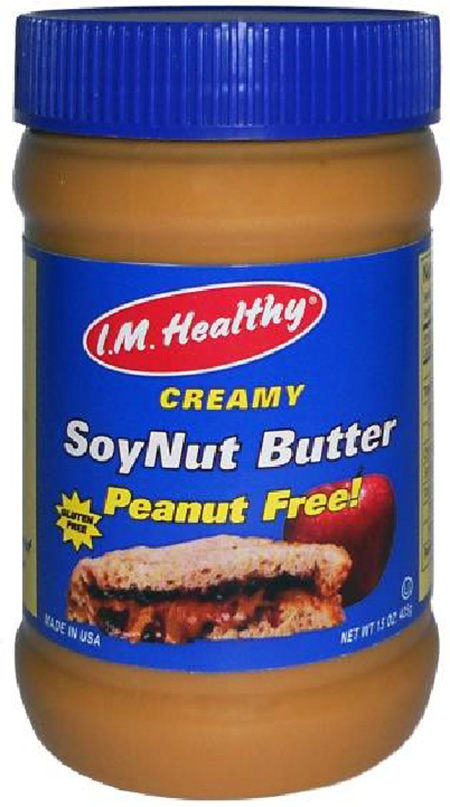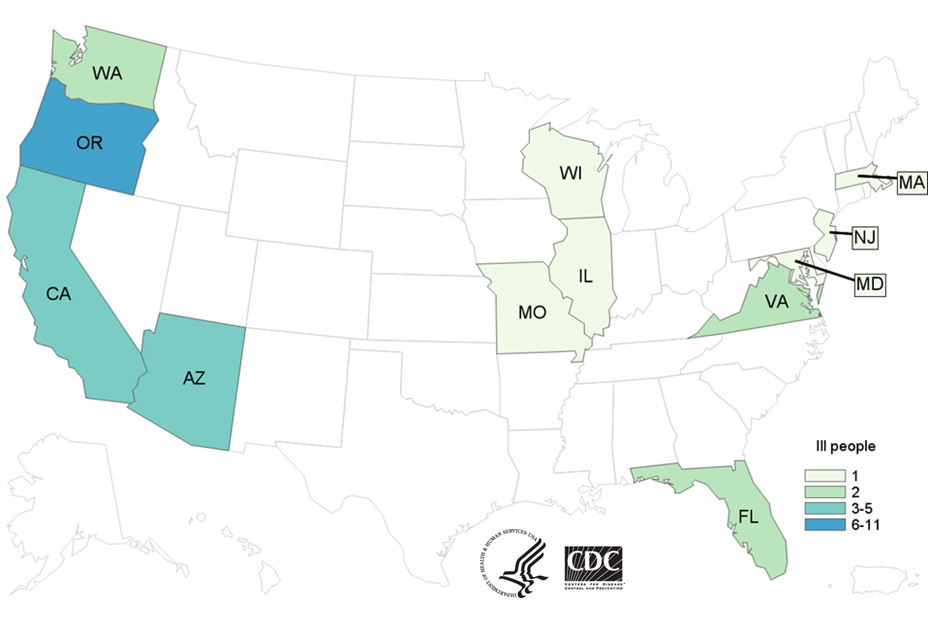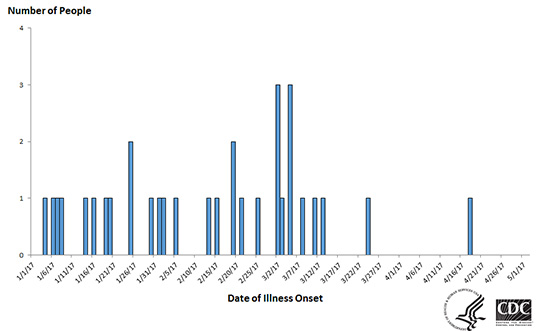2017 E. coli Outbreak Linked to I.M. Healthy Brand SoyNut Butter
Posted May 4, 2017 11:45 AM EST
Although the outbreak investigation is over, illnesses may continue for some time. The recalled SoyNut Butter products have long shelf lives and may still be in people’s homes or in institutions. People who don’t know about the recalls could continue to eat the products and get sick. The recalled products are listed on the Recalls & Advice to Consumers page.
- Although the outbreak investigation is over, illnesses may continue for some time. The recalled SoyNut Butter products have long shelf lives and may still be in people’s homes or in institutions. People who don’t know about the recalls could continue to eat the products and get sick.
- Several products were recalled as a result of this investigation.
- The recalled products are listed on the Recalls & Advice to Consumers page.
- CDC recommends that consumers do not eat, and childcare centers, schools, and other institutions do not serve, any of the recalled products.
- Even if some of the product was eaten or served and no one got sick, throw the rest of it away. Put it in a sealed bag in the trash so that children, pets, or other animals can’t eat it.
- CDC, multiple states, and the U.S. Food and Drug Administration (FDA) investigated a multistate outbreak of Shiga toxin-producing Escherichia coliO157:H7 (STEC O157:H7) infections.
- Thirty-two people infected with the outbreak strains of STEC O157:H7 were reported from 12 states.
- Twelve people were hospitalized. Nine people developed hemolytic uremic syndrome, a type of kidney failure. No deaths were reported.
- Twenty-six (81%) of the 32 ill people in this outbreak were younger than 18 years.
- Epidemiologic, laboratory, and traceback evidence indicated that I.M. Healthy brand SoyNut Butter was the likely source of this outbreak.
Introduction
CDC collaborated with public health and regulatory officials in many states and the U.S. Food and Drug Administration (FDA) to investigate a multistate outbreak of Shiga toxin-producing Escherichia coli (STEC) infections.
Public health investigators used the PulseNet system to identify illnesses that might be part of this outbreak. Thirty-two people infected with the outbreak strains of STEC O157:H7 were reported from 12 states. A list of the states and the number of cases in each can be found on the Case Count Map page. Whole genome sequencing (WGS) performed on clinical isolates from ill people showed that the isolates were closely related genetically. This close genetic relationship provided more evidence that people in this outbreak became ill from a common source.
Illnesses started on dates ranging from January 4, 2017 to April 18, 2017. Ill people ranged in age from 1 to 70 years, with a median age of 9. Twenty-six (81%) of the 32 ill people were younger than 18 years. Among ill people, 59% were male. Twelve ill people were hospitalized, and 9 people developed hemolytic uremic syndrome, a type of kidney failure. No deaths were reported.
Investigation of the Outbreak
Epidemiologic, laboratory, and traceback evidence indicated that I.M. Health brand SoyNut Butter was the likely source of this outbreak. SoyNut Butter is a nut-free substitute for peanut butter.
In interviews, ill people or their family members answered questions about the foods they ate and other exposures in the week before they became ill. Twenty-five (78%) of the 32 people reached for interview reported either eating I.M. Healthy brand SoyNut Butter at home (19 people) in the week before they became ill, attending a facility that served I.M. Healthy brand SoyNut Butter (2 people), or attending childcare centers that served I.M. Healthy brand SoyNut Butter and I.M. Healthy brand granola coated with SoyNut Butter (4 people).
Investigators reported to CDC two more ill people who either developed HUS or had a diagnostic test showing they were infected with STEC bacteria. In interviews, both of these ill people reported eating I.M. Healthy brand SoyNut Butter in the week before becoming ill. However, CDC did not include these people in the outbreak case count because no bacterial isolates, or samples, were available for DNA fingerprinting. Public health investigators use DNA fingerprinting to identify illnesses that are part of multistate outbreaks.
Laboratory testing identified STEC O157:H7 in opened containers of I.M. Healthy brand SoyNut Butter collected from the homes of ill people in California, Oregon, and Washington. Officials in California also isolated STEC O157:H7 in unopened containers of I.M. Healthy brand SoyNut Butter collected from retail locations. WGS showed that the STEC O157:H7 in all of these containers of SoyNut Butter were closely related genetically to isolates from ill people, providing more evidence that people in this outbreak got sick from eating I.M. Healthy brand SoyNut butter.
Although the outbreak investigation is over, illnesses may continue for some time. The recalled SoyNut Butter products have long shelf lives and may still be in people’s homes or in institutions. Consumers who don’t know about the recalls could continue to eat the products and get sick. The recalled products are listed on the Recalls & Advice to Consumers page.


